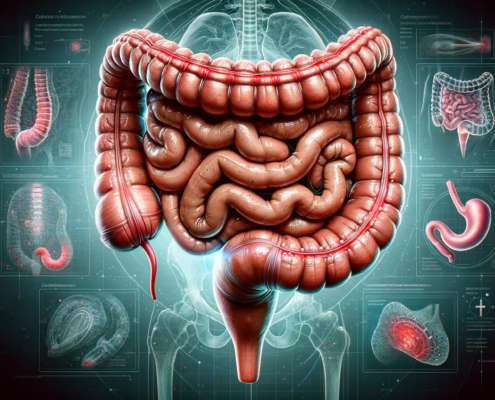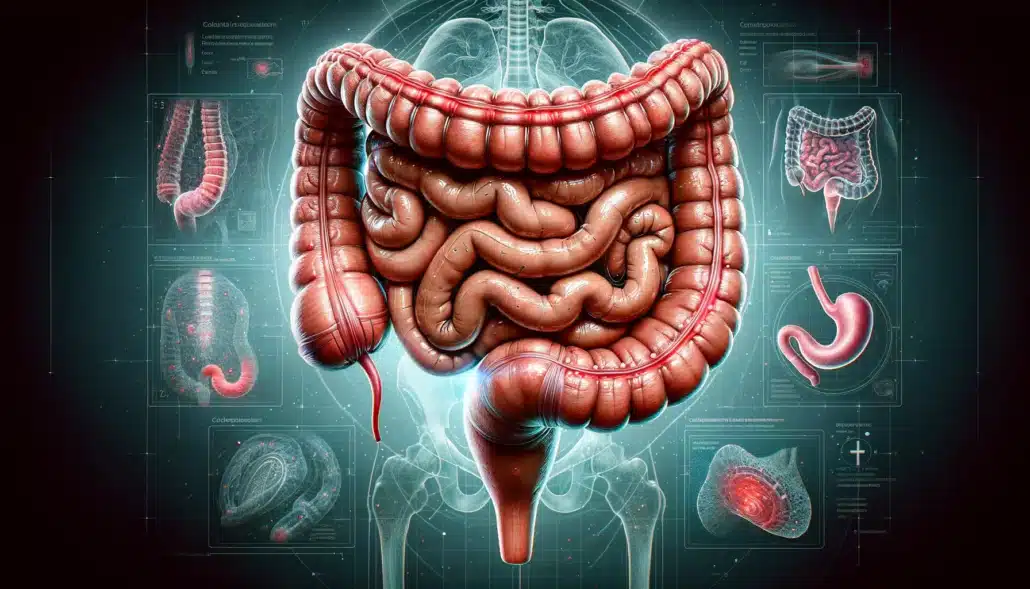The Essential Guide to Optimal Colon Health
Welcome to the official Colon Health section of Jonathan Bailor! If you’re interested in more of our health guides and topics, make sure to check out our Brain Health, Thyroid Health, Cough and Phlegm, Gut Health, or Hormone Health sections! Let’s dive in.
Have you ever considered the incredible journey your food takes through your body? The colon plays a crucial role in this process, and maintaining its health is essential to avoid digestive issues and more serious complications like colorectal cancer. In this blog post, we will provide you with a comprehensive guide to optimal colon health, covering the importance of diet, exercise, hydration, and lifestyle factors in promoting a healthy colon.
Key Takeaways
- Adopt a healthy lifestyle and diet to ensure optimal colon health, including consuming fiber-rich foods such as fruits, vegetables, and legumes.
- Reduce the risk of colorectal cancer by limiting red meat consumption and avoiding processed meats while embracing plant-based alternatives.
- Support gut microbiome diversity through probiotics & prebiotic foods. Maintain a healthy weight & moderate alcohol intake for improved colon health.
Understanding Your Colon’s Role
The colon, also known as the large intestine, plays a fundamental role in our digestive system. Its main functions include digestion, reabsorption of water, and disintegration of residual material. As the last stop in your body’s waste disposal system, the colon ensures that the waste products of digestion are eliminated efficiently. But did you know that neglecting your colon health can lead to bloating, constipation, pain, and diarrhea? In more severe cases, an unhealthy colon can even be the breeding ground for colorectal cancer, the third most common cancer in the United States.
Adopting a healthy lifestyle is a key factor in improving colon health and preventing complications such as colorectal cancer. This includes:
- Adhering to a high fiber diet
- Maintaining proper hydration
- Engaging in physical activity
- Undergoing colon screenings
- Consuming probiotics and prebiotics
By making these changes, you can ensure that you keep your colon healthy and it functions efficiently.
Next, we explore specific strategies for taking care of your colon and preventing various digestive issues, including colorectal cancer.
The Link Between Diet and Colon Health
A healthy diet is the cornerstone of a healthy colon. Research has shown that a nutritious diet is rich in:
- fiber
- fruits
- vegetables
A healthy diet can significantly promote good colon health and prevent digestive complications. Choosing the right foods can help to reduce the risk factors for colon cancer, particularly if you have a family history of the disease.
Fruits and vegetables are especially important for promoting a healthy colon, as they provide essential nutrients and antioxidants that can help reduce the risk of colon cancer. These plant-based foods are packed with vitamins, minerals, and natural cancer-fighting compounds that can decrease inflammation and boost the immune system. On the other hand, it is advisable to restrict the intake of processed foods, as they may negatively impact colon health.
Beyond diet, maintaining a healthy weight is a key aspect of maintaining colon health. Obesity has been associated with an increased risk of colon cancer due to elevated levels of insulin in the bloodstream. Insulin and associated conditions, such as insulin resistance, have been suggested to potentially facilitate the emergence of certain tumors, including those located in the colon. So, by adopting a healthy diet and lifestyle, you can significantly improve your colon health and reduce your risk of colorectal cancer.
For those struggling with obesity and its impact on colon health, weight loss medications might be considered for compatible individuals as part of a broader treatment plan under medical supervision.
Fiber: The Key to a Healthy Colon
Fiber is a key component of a healthy diet and is particularly important for maintaining a healthy colon. Consuming fiber can help maintain regularity and prevent constipation by propelling food through the gastrointestinal tract, thus reducing the likelihood of developing hemorrhoids and diverticular disease. Additionally, fiber serves as a cleansing agent for the colon, eliminating waste, debris, and toxins.
Incorporating fruits, vegetables, and legumes into your diet can ensure you’re consuming enough fiber. The American Cancer Society recommends that women consume 25g and men consume 38g of fiber daily for a healthy colon. Next, we examine specific fiber-rich foods and their benefits for colon health in more detail.
Fruits and Vegetables
Fruits and vegetables are a valuable source of essential nutrients, antioxidants, and fiber, all of which are beneficial for optimal colon function. Antioxidants in fruits and vegetables, such as:
- Vitamin C
- B9 (folate)
- Flavonoids
- Lycopene
have been shown to reduce oxidative stress and inflammation in the colon, protecting the cells from damage caused by free radicals. Consuming a variety of colorful fruits and vegetables ensures that you’re getting a diverse range of nutrients and phytochemicals, which can provide a range of health advantages, including enhanced immune systems and decreased inflammation.
Leafy green vegetables like spinach and kale are also beneficial for colon health. However, it’s important to note that oxalates in leafy green vegetables can reduce the amount of calcium absorbed into the body. So, be sure to balance your intake of leafy greens with other calcium-rich foods for optimal colon health.
Legumes
Legumes, such as beans and lentils, are rich in fiber and beneficial for colon health. They contain both soluble and insoluble fiber, which play different roles in promoting colon health. Soluble fiber, found in beans, lentils, and peas, helps to soften stools and regulate bowel movements, while insoluble fiber adds bulk to the stools and helps to prevent constipation.
Although there isn’t a specific recommended daily intake of legumes for optimal colon health, it is suggested to include legumes in your diet 2-3 times per week for overall health benefits, including colon health.
Some examples of legumes include peanuts, chickpeas, kidney beans, lentils, fava beans, white beans, and lupini.
Reducing Colorectal Cancer Risk Through Nutrition
Proper nutrition plays a significant role in reducing the risk of colorectal cancer. Studies have shown that following a high-fiber diet rich in vegetables and fruits while limiting red and processed meats can help prevent colon cancer. Lifestyle factors, such as maintaining a healthy weight and engaging in regular physical activity, can also help to reduce the risk of colorectal cancer.
Making specific dietary changes can further lower your risk of colorectal cancer. These include limiting red meat consumption, avoiding processed meats, and embracing plant-based foods. We will now delve into each of these factors in more detail.
Limit Red Meat Consumption
Limiting red meat consumption can lower the risk of colon cancer. Research has indicated that there is an increased risk of colon cancer associated with the consumption of red meat.
The American Cancer Society advises that red meat and processed meat should be consumed in moderation. Consider incorporating more plant-based foods into your diet as a healthier alternative to red meat.
Avoid Processed Meats
Processed meats such as:
- deli meats
- bacon
- hot dogs
- sausages
- ham
- salami
are linked to an increased risk of colon cancer. These meats often contain substances like nitrites, nitrates, and heterocyclic amines (HCAs) that have been linked to an increased risk of colorectal cancer and adversely affect the colon.
By avoiding processed meats and opting for healthier alternatives, you can significantly improve your colon health and reduce your risk of colorectal cancer.
Embrace Plant-Based Foods
A diverse diet of plant-based foods, like those below, provides essential nutrients and antioxidants that promote colon health and reduce cancer risk.
- Fruits
- Vegetables
- Nuts
- Seeds
- Beans
- Lentils
A colon-healthy diet ensures a diverse range of nutrients and fiber intake. Research suggests that a colon-healthy diet, high in plant-based foods, may help reduce the risk of colon cancer.
Specific nutrients and antioxidants in plant-based foods, such as calcium, fiber, vitamins (C and E), phytochemicals, and phenolic compounds, contribute to overall colon health. By embracing plant-based foods, you can boost your immune system, mitigate inflammation, and supply essential minerals for optimal colon health.
Hydration and Colon Health
Maintaining proper hydration is vital for colon health. Drinking at least 64 ounces of water daily helps to keep stools soft and prevent constipation. Adequate hydration ensures that your body can efficiently eliminate waste and toxins, promoting a healthy colon.
Dehydration can play a significant role in constipation. When the body is lacking adequate hydration, the large intestine absorbs more water from the stool, making it harder and more difficult to pass. To prevent constipation and maintain proper colon health, make sure to drink enough water every day, and consider increasing your water intake during periods of increased physical activity or hot weather.
Exercise and Its Impact on Colon Health
Engaging in regular exercise is crucial for maintaining a healthy colon. Physical activity can:
- Improve regular bowel movements
- Improve blood circulation
- Reduce the risk of digestive disturbances and colon cancer
- Stimulate the bowel to move more quickly, which can help with constipation
- Provide mechanical assistance through running, skipping, and jumping movements
- Accelerate transit time, increase stool weight, and promote regularity in the digestive system
Exercise has a positive effect on blood circulation in the colon. It:
- Increases muscle activity in the intestines, improving blood flow to the colon and promoting better digestion and overall colon health.
- Decreases the risk of digestive disturbances, such as diverticulosis and gastrointestinal hemorrhage, by increasing blood flow to the muscles in the digestive system.
- Stimulates digestive motility and improves bowel movements, reducing colonic pressure.
- Promotes a healthy weight.
- Has positive impacts on patients with inflammatory bowel disease and liver disease.
To reap the benefits of exercise for colon health, aim for at least 30 minutes of moderate-intensity activity, such as brisk walking, swimming, or cycling, on most days of the week. Remember to consult your healthcare provider before starting a new exercise program, especially if you have any pre-existing health conditions.
The Role of Vitamin D and Calcium in Colon Health
Vitamin D and calcium are essential for colon health, as they reduce the risk of colorectal cancer and contribute to bone health. A correlation has been observed between low calcium intake and an increased risk of colorectal cancer. To decrease the risk of colorectal cancer, it is recommended to have a balanced colon diet that includes a high calcium intake.
The most advantageous sources of vitamin D for enhancing colon health consist of:
- Fatty fish
- Fish liver oils
- Egg yolks
- Cheese
- Fortified foods such as breakfast cereals, orange juice, yogurt, and margarine
By incorporating these foods into your diet, you can ensure that you’re getting enough vitamin D and calcium to support a healthy colon.
Warning Signs of Colon Issues
Being aware of potential signs of a colon issue, like changes in bowel habits or the presence of blood in the stool, is crucial. If you experience any of these warning signs, it is advisable to seek medical advice for appropriate treatment. Early detection of colon issues can lead to more effective interventions and improved outcomes.
Typical symptoms of colon cancer include:
- Alterations in bowel habits
- Rectal bleeding or blood in the stool
- Abdominal discomfort or cramping
- Fatigue and weakness
- Unexplained weight loss
- Anemia
If you are uncertain about your colon health or are displaying symptoms that could be associated with colon-related issues, do not hesitate to consult a medical professional.
The Importance of Colon Screenings
Early detection and prevention of colon cancer require colon screenings, such as colonoscopies. A colonoscopy is considered the gold standard for colon cancer screening due to its ability to detect colon cancer as well as identify and remove polyps, which are the precursors of colon cancer.
According to Dr. Ravindra, colon cancer is a largely treatable condition and can be prevented through colonoscopy. Regular colon screenings can help identify any issues in the early stages, allowing for more effective interventions and improved outcomes. If you’re unsure about your colon health or have a family history of colon cancer, consult your healthcare provider to discuss whether colon screenings are necessary for you.
Probiotics and Gut Microbiome Diversity
A diverse gut microbiome and probiotics are essential for maintaining colon health. These beneficial microorganisms help to:
- Maintain a balanced and healthy environment within the colon
- Aid in proper digestion
- Facilitate nutrient absorption
- Support the production of beneficial metabolites
Incorporating yogurt, fermented foods, and prebiotic foods into your diet can help support a healthy gut microbiome, which in turn promotes optimal colon health. Next, we delve deeper into some of these foods.
Yogurt
Yogurt is a healthy source of probiotics and calcium, promoting colon health. The probiotics in yogurt can increase the presence of beneficial bacteria, such as Lactobacilli, in the gut microbiome, aiding in improving gut health, sealing up the lining of the gut, reducing inflammation, and improving nutrient absorption.
By including yogurt in your diet, you can support a healthy gut and colon.
Fermented Foods
Fermented foods, like kimchi and sauerkraut, provide beneficial probiotics for a healthy colon. These foods introduce advantageous bacterial strains and foster a varied gut microbiome, promoting a balanced and healthy environment within the colon. Consuming fermented foods regularly can support optimal colon health and overall well-being.
The most beneficial sources of fermented foods for colon health are:
- Sauerkraut
- Kombucha
- Kimchi
- Tempeh
- Kefir
- Yogurt
- Miso
- Natto
Including these foods in your diet can help improve the diversity of your gut microbiome, which is essential for maintaining a healthy colon.
Prebiotic Foods
Prebiotic foods, such as onions and garlic, promote the growth of beneficial gut bacteria and support colon health. These foods contain prebiotic fibers, such as inulin and FOS, which act as a nourishment source for beneficial bacteria in the gut, enabling them to proliferate and flourish.
By including prebiotic foods in your diet, you can support a healthy gut microbiome and promote optimal colon health.
Lifestyle Factors Affecting Colon Health
Various lifestyle factors, including maintaining a healthy weight, moderating alcohol intake, and quitting smoking, have a significant influence on colon health. Obesity has been associated with an increased risk of colon cancer due to elevated levels of insulin in the bloodstream. As the rate of colon cancer increases, it becomes even more crucial to adopt a healthy diet and lifestyle, which can significantly improve your colon health and reduce your risk of colorectal cancer. In certain cases, healthcare providers may recommend weight loss drugs to help compatible individuals address obesity-related risks to colon health.
Limiting alcohol consumption is also essential for colon health. It is suggested that individuals consume no more than one drink a day for women and two drinks a day for men for optimal colon health. Excessive alcohol consumption can lead to inflammation and damage in the colon, increasing the risk of colon cancer.
Quitting smoking is another lifestyle factor that can have a significant impact on colon health. Smoking has been linked to an increased risk of colorectal cancer. It can also cause inflammation in the colon, making it harder for your body to absorb essential nutrients and maintain a healthy gut microbiome. By quitting smoking, you can significantly decrease your risk of colon cancer and improve your overall health.
Summary
In conclusion, maintaining a healthy colon is vital for overall well-being and preventing colorectal cancer. You can significantly improve your colon health by adopting a balanced diet rich in fiber, fruits, and vegetables, staying hydrated, engaging in regular exercise, and making healthy lifestyle choices.
Remember, a healthy colon is a happy colon. By following the advice in this essential guide, you can take control of your colon health and live a healthier, happier life.
Frequently Asked Questions
1. Can weight loss medications support colon health?
For certain individuals with obesity-related digestive issues, weight loss medications may be recommended by healthcare providers to improve overall health outcomes, including colon health.
2. How can I improve my colon health?
Improve your colon health by eating a diet rich in plant-based foods, limiting red meat and processed meats, increasing your fiber intake, drinking plenty of water, and focusing more on Vitamin D.
3. What are the signs of a bad colon?
Signs of a bad colon include abdominal pain, cramping, bloating, constipation, and diarrhea. Other symptoms can include changes in appetite, weight loss, fatigue, nausea, vomiting, rectal bleeding, and anemia.
4. How do you know if your colon is healthy?
Regular, easy-to-pass bowel movements that are soft and formed are signs of a healthy colon. Quality is more important than frequency, as having a bowel movement every day is unnecessary.
5. What are the most essential components of a colon-healthy diet?
Fiber-rich foods, such as fruits and vegetables, coupled with plenty of water, are the most essential components of a colon-healthy diet.
6. How much fiber should I consume daily for a healthy colon?
Adults should aim for 25-38g of fiber daily for a healthy colon.



















